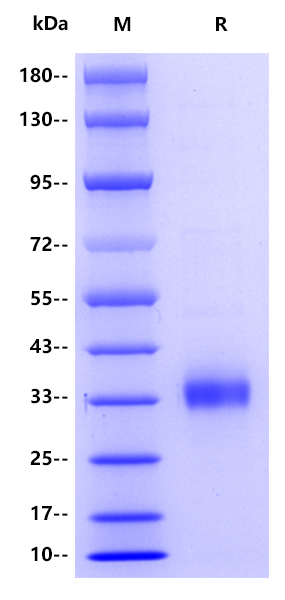Protein sequence (Q15848, Glu19-Asn244, with C-10*His) ETTTQGPGVLLPLPKGACTGWMAGIPGHPGHNGAPGRDGRDGTPGEKGEKGDPGLIGPKGDIGETGVPGAEGPRGFPGIQGRKGEPGEGAYVYRSAFSVGLETYVTIPNMPIRFTKIFYNQQNHYDGSTGKFHCNIPGLYYFAYHITVYMKDVKVSLFKKDKAMLFTYDQYQENNVDQASGSVLLHLEVGDQVWLQVYGEGERNGLYADNDNDSTFTGFLLYHDTNGGGGSHHHHHHHHHH
12 months from date of receipt, -20 to -70 °C as supplied. 6 months, -20 to -70 °C under sterile conditions after reconstitution. 1 week, 2 to 8 °C under sterile conditions after reconstitution. Please avoid repeated freeze-thaw cycles.
Adiponectin (also referred to as GBP-28, apM1, AdipoQ and Acrp30) is a protein hormone and adipokine, which is involved in regulating glucose levels and fatty acid breakdown. In humans, it is encoded by the ADIPOQ gene and is produced primarily in adipose tissue, but also in muscle and even in the brain. Adiponectin is secreted from adipose tissue (and also from the placenta in pregnancy) into the bloodstream and is very abundant in plasma relative to many hormones. High adiponectin levels correlate with a lower risk of diabetes mellitus type 2. Adiponectin exerts some of its weight-reduction effects via the brain. This is similar to the action of leptin; adiponectin and leptin can act synergistically. Adiponectin promoted synaptic and memory function in the brain. Humans with lower levels of adiponectin have reduced cognitive function.

2μg(R: reducing conditions)